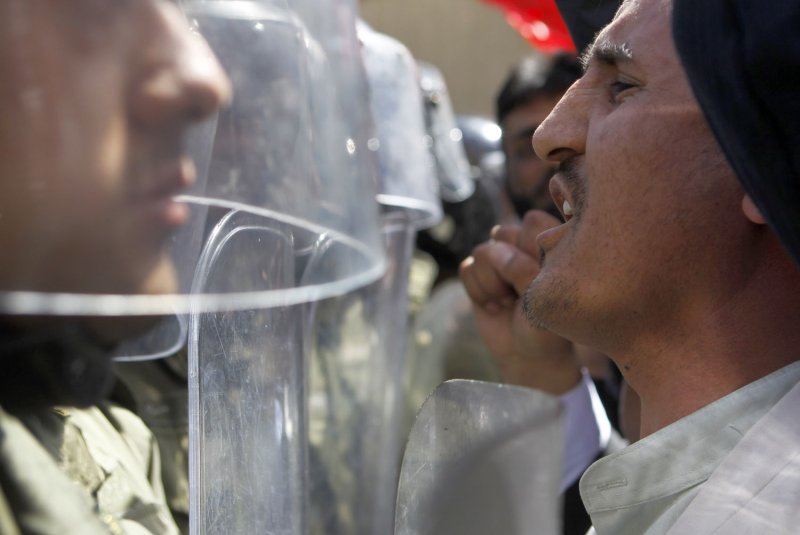1 of 4 | Foreign clerics confront Iranian policemen in front of the Saudi Arabia embassy in Tehran, Iran on April 8, 2011. Hundreds of foreign clerics living in Iran protested in front of the Saudi Arabia embassy condemning the Saudi military support for the Bahrain government. UPI/Maryam Rahmanian |
License Photo
BEIRUT, Lebanon, May 31 (UPI) -- The disclosure that the United Kingdom trained Saudi Arabian forces used to crush protests in Bahrain and has sold to 15 Middle Eastern states military equipment that could be used against civilians is raising questions about the morality of providing arms to repressive regimes.
Since pro-democracy uprisings erupted across the Middle East and North Africa in January, several thousand people have been killed, mainly by the security forces of regimes under attack.
The British government has withdrawn 160 export licenses -- mainly involving Egypt, Bahrain, Tunisia and Libya -- since January, according to a report by a parliamentary panel drawn from four House of Commons committees on defense, business, foreign affairs and international development.
It described London's action as "vigorous back-pedaling" and declared the withdrawals reflected the extent "of policy misjudgment that has occurred."
The report, issued in April, "will be uncomfortable reading for the (British) government, which put trade at the heart of its diplomatic mission," the Financial Times observed.
The newspaper reported that British export license approvals since January 2009 have covered "components for military helicopters in Algeria, submachine guns and tear gas to Bahrain, machine guns to Egypt and hand grenades to Jordan."
British defense contractors have also sold "small arms ammunition to Syria, hand grenades, sniper rifles and tear gas to Saudi Arabia and shotguns to Morocco."
John Stanley, chairman of the investigating committee, suggested that Bahrain may have used British-made equipment, including sniper rifles sold to the tiny Persian Gulf monarchy and armored personnel carriers sold to Saudi Arabia.
The APCs were Tactica vehicles sold to the Saudi Arabian national guard, a tribal-based force loyal to the ruling family, and used in the March 14 intervention in Bahrain by a Saudi-led column from the Gulf Cooperation Council, an alliance of six Arab monarchies in the Persian Gulf.
BAE Systems, Britain's largest defense conglomerate and which builds the Tacticas, insisted that it only exports military equipment when the government issues a license.
Arguably the most controversial of the U.K. arms sales were those to the Libyan regime of Moammar Gadhafi, for decades accused by the West of supporting terrorism.
However, when Libya's outlaw status was lifted in 2004 after Gadhafi abandoned his nuclear program and renounced terrorism, Western arms companies, as well as East bloc suppliers led by Russia, fell over themselves to sell him weapons systems.
Gadhafi is now fighting for the survival of his regime against a rebellion triggered by the political upheaval that is sweeping the Arab world. U.S. and NATO forces are aiding the rebels seeking to topple the regime.
The British reports covers arms sales in 2009 and early 2010, when Britain's Labor Party was in power.
But the committee also accuses the successor Conservative-Liberal Democrat coalition for failing to anticipate how the weapons sold to authoritarian Arab regimes with dismal human rights records might be used.
Gadhafi, President Ali Abdullah Saleh of Yemen and President Bashar al-Assad of Syria have unleashed the might of their armed forces, including tanks, against largely unarmed domestic opponents.
Britain isn't the only Western state to fall under scrutiny since the Middle East bloodletting began as authoritarian regimes, long tolerated by the West, came under threat from their own people.
Human rights campaigners and others have long assailed Western governments for arming unsavory rulers in the region and elsewhere in a global trade that was worth an estimated $1.6 trillion in 2010.
But the increasing violence by regimes in Syria, Yemen and Libya has intensified international efforts to curtail such arms sales.
Under an Arms Trade Treaty, a multilateral agreement being developed under a 2006 mandate by the U.N. General Assembly, questionable arms sales would be considerably curbed.
But, observed Laicie Olson, senior analyst with the Center for Arms Control and Non-Proliferation in Washington, there would still be problems if the ATT is adopted.
"Under the ATT, the U.S. and UK would be able to arm Moammar Gadhafi but not Libya's rebels since Gadhafi is still the head of an internationally recognized government and rebels … are not," Olson said.
The irony of the fighting in Libya is that the NATO members that are bombarding Gadhafi's forces under a U.N.-mandated no-fly zone, are using the conflict to showcase their combat jets and weapons systems to potential buyers.















